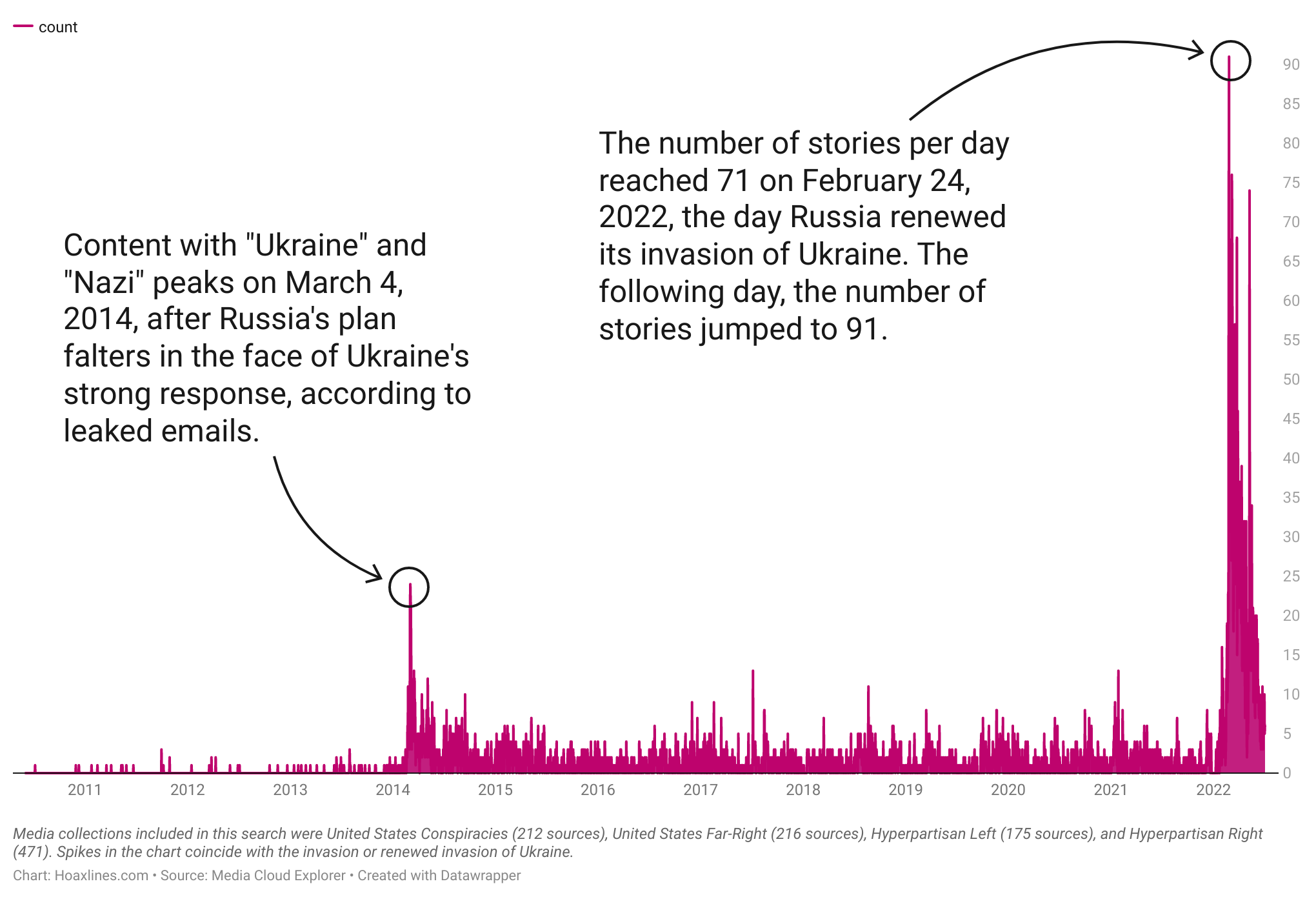
Hoaxlines • Aug 3, 2022
We examined the surge in content discussing “Ukraine” and “Nazi” in far-left, far-right, hyperpartisan, and conspiracy theory websites during the Russian invasions of Ukraine in 2014 and 2022. The findings suggest that the increased coverage of Ukraine-Nazi stories coincided with key events in the Kremlin-orchestrated invasions in both years, including protests, escalations, and strategic maneuvers. These media outlets amplified false Kremlin narratives that likely sought to justify Russia’s actions in Ukraine.
In both 2014 and 2022, the surge in Ukraine-Nazi content coincided with key events related to Russian invasions and actions in Ukraine. The false narratives seemingly aimed to justify Russia’s aggression and actions.
The findings highlight the potential impact of media manipulation on public opinion and the justification of military actions. By amplifying false narratives, these outlets may contribute to the spread of misinformation, negatively affecting international relations and conflict resolution efforts. Additionally, the study underscores the importance of critically examining media content and providing accurate information to counter false narratives and misinformation.
Hoaxlines gathered data to assess media discussions of “Ukraine” and the term “Nazi.” We searched across a decade from June 2010 through July 2022 using Media Cloud Explorer. We found that content discussing “Ukraine” and “Nazi” surged as the 2014 Kremlin-orchestrated events in Ukraine stumbled. The Ukraine-Nazi stories also increased before and coinciding with Russia’s February 2022 invasion.

Counts for stories with “Ukraine” and “Nazi” from June 2010 to July 2022.
We searched for the terms in outlets categorized as far-left, far-right, hyperpartisan, and conspiracy theory websites. Why and how these outlets ended up promoting false Kremlin narratives in 2014 and 2022 has received limited research interest but warrants examination.
Even to debunk the claims, outlets covering the subject risk contributing to media manipulation when they fail to provide critical information: Widespread concern about extremism in Ukraine was rare until Russia claimed Ukrainian extremism was its justification for seizing Ukrainian land.
On March 1, 2014, the Russian parliament approved a troop deployment to Ukraine. By March 3, Kremlin-aligned groups had stormed the regional government building in Donetsk. The demonstrators demanded a split from Ukraine, but the protests had largely failed to produce the Kremlin’s desired effect, according to leaked emails from the time between Russian and pro-Russian actors.
The strong response from Ukrainian law enforcement had deterred pro-Russian figures who emailed collaborators inside of Russia to complain about their struggle. Western leaders condemned Russia’s actions in Ukraine on March 3, 2014.
At the height of the Ukraine-Nazi content surge on March 4, 2014, Putin claimed the military exercises were over. The following day, “Russian soldiers [blockaded] Ukrainian navy command ship Slavutych at the Crimean port of Sevastopol.” Putin scoffed at requests to remove Russian forces from Crimea, claiming they were not under his command.
Within days, an international voting observation team would be refused entry to Crimea with a warning shot. By April 2014, pro-Russian actors would seize the Regional Administration of Donetsk and declare it a “republic.”
In 2022, similar events unfolded, with denials that Russia intended to invade Ukraine. Russia followed its denials by renewing its invasion of Ukraine under the guise of a “Special Military Operation” on February 24, 2022.
Content discussing “Ukraine” and “Nazi” surged as the 2014 Kremlin-orchestrated events in Ukraine faltered. The Ukraine-Nazi stories also increased preceding and coinciding with Russia’s February 2022 invasion.